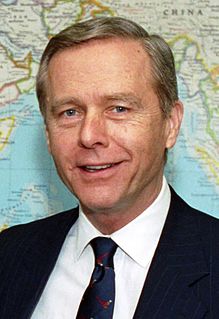A Quote by Nicky Gumbel
Sometimes God teaches us how to solve our problems. Sometimes God teaches us how to face our problems
Related Quotes
There are two gods. The god our teachers teach us about, and the God who teaches us. The god about whom people usually talk, and the God who talks to us. The god we learn to fear, and the God who speaks to us of mercy. The god who is somewhere up on high, and the God who is here in our daily lives. The god who demands punishment, and the God who forgives us our trespasses. The god who threatens us with the torments of Hell, and the God who shows us the true path.
There are two gods. A god who casts us off because of our sins, and a God who calls to us with His love.
It teaches us how to run our lives individually. How to run our families, how to run our churches. But it teaches us how to run all our public policy and everything in society. And that's the reason, as your congressman, I hold the Holy Bible as being the major directions to me of how I vote in Washington, D.C., and I'll continue to do that.
And what I've come to learn is that it's the manufacturer's handbook, is what I call it. It teaches us how to run our lives individually, how to run our families, how to run our churches. But it teaches us how to run all of public policy and everything in society. And that's the reason as your congressman I hold the Holy Bible as being the major directions to me of how I vote in Washington, D.C., and I'll continue to do that.
A personal relationship with God enhances life. First, it enables us to accept our limitations without being frustrated by them. It assures us that problems we can't solve are not necessarily insoluble. Second, when we need it, God offers us a sense of forgiveness, a sense of cleansing from our incompleteness. . . . Last and perhaps most important, a personal relationship with God redeems us from the fear of death. We needn't be afraid that all our good deeds will vanish when we die.
God wants to be our partner throughout life. Too often we are tempted to either carry the entire load ourselves or give everything to God and do nothing. God doesn't like either strategy. Sometimes He moves before us and sometimes after us - but He doesn't move without us. Without God... we cannot. Without us... God will not.
And I've come to the place where I believe that there's no way to solve these problems, these issues - there's nothing that we can do that will solve the problems that we have and keep the peace, unless we solve it through God, unless we solve it in being our highest self. And that's a pretty tall order.
How wrong it is to use God as a stop-gap for the incompleteness of our knowledge. . . . We are to find God in what we know, not in what we don't know; God wants us to realize his presence, not in unsolved problems but in those that are solved. . . . God is no stop-gap; he must be recognized as the center of life, not when we are at the end of our resources.
Thousands of salespeople are pounding the pavements today, tired, discouraged and underpaid. Why? Because they are always thinking only of what they want. They don't realize that neither you nor I want to buy anything. If we did, we would go out and buy it. But both of us are eternally interested in solving our problems. And if salespeople can show us how their services or merchandise will help us solve our problems, they won't need to sell us. We'll buy. And customers like to feel that they are buying - not being sold.

































